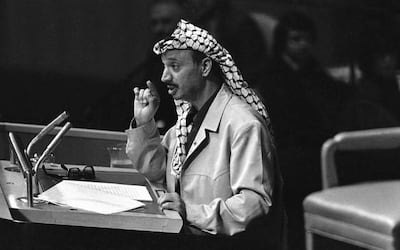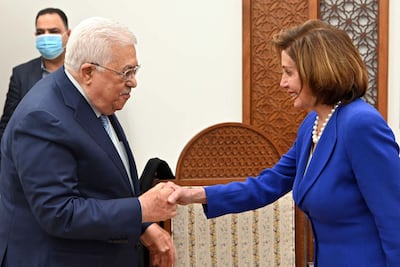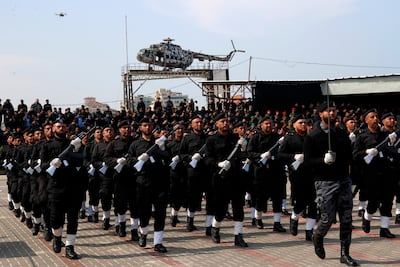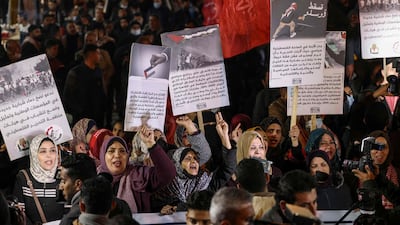When it comes to the Palestine Liberation Organisation, there's good news and bad news. The bad news is that the PLO is nearly dead. The cause of oncoming death is yet to be determined – either old age or self-inflicted wounds. The good news is that the Palestinian people’s quest for national self-identity and self-determination remains very much alive and well.
The PLO was created in 1964 to embody the Palestinian people’s right to national independence and self-determination. Israel has always been intolerant of the PLO and, almost since the organisation's inception, the state waged an intense propaganda campaign against the group. Israel projected it as a terrorist entity, a disruptive agent of the erstwhile Soviet Union, and, when the PLO was embraced by the Non-Aligned Movement, Israel drew on a colonial-era racist trope describing it as being representative of the world’s uncivilised peoples confronting civilised democracies.
In fact, Israel's main objection to the PLO, in the words of its leaders, was not "terrorism". Rather, it was because the PLO then represented the Palestinian national identity – and recognition of it meant accepting the Palestinian people's right to self-determination.
This was an issue in 1975, when Israel extracted a US pledge not to engage with the PLO in exchange for Israel's acceptance of a US-brokered Israel-Egypt-Syria disengagement plan. That "no-talk" pledge hampered US diplomacy for 17 years. It cost the then US ambassador to the UN, Andrew Young, his job when it was revealed that he met the PLO's UN representative in New York. Legislation was passed prohibiting the PLO from operating an office or even visiting the US. Members of the US Congress were threatened and/or denounced for speaking with the PLO.

This Israeli rejection of the PLO and Palestinian self-identity even complicated US efforts to organise the Madrid Peace Conference in 1991. The Israelis only agreed to attend on the condition that the Palestinian participants were not members of the PLO and would be present only as part of the Jordanian delegation.
The negotiations that followed Madrid were awkward, at best, leading to 11 failed rounds of talks. The impasse was broken when some Israeli and PLO representatives took it upon themselves to negotiate outside the constraints of the Madrid Process. The agreement they reached was later accepted by both the Israeli government and the PLO. In it, the PLO affirmed its recognition of Israel's right to exist and Israel recognised the PLO as the sole representative of the Palestinian people.
Tragically, Oslo turned out to be a trap. While on three separate occasions the Palestinians reaffirmed their recognition of Israel's right to exist, it became clear that Israel never intended to move beyond its pre-Oslo position and that Palestinians should expect no more than "limited autonomy" under Israeli control.
During the next three decades, Israel tightened its domination of Palestinian life, which included seizing more land, expanding its colonial outposts in occupied lands, and exercising increased repressive control over the Palestinian economy, resources and freedom of movement.
During this same time, the Palestinians took steps that have proved fatal to the PLO. They merged the PLO with the Oslo-created Palestinian Authority, thereby effectively cutting off the organisation from the Palestinian diaspora. They subordinated the PA to Israeli domination of their economy and internal security, relying on Israeli goodwill and the whims of the international community. In the process, the PA became a supplicant for funds and a dependent.


The emergence of potent factions outside of the traditional PLO framework – Hamas and Islamic Jihad, the competing Islamic movements in Palestine – have only complicated this deterioration. Their rejection of the terms of Oslo and their penchant for acts of self-destructive violence against civilians – whether past use of suicide bombers or more recent launching of missiles into Israel – have tightened Israel's strangulation of Gaza and deepened the divide within the Palestinian polity, rendering the PLO even less representative of the Palestinian people.
Today, the PA and Hamas run parallel organisations – one in the West Bank, the other in Gaza. Both use funds – derived from taxation or external donors – to provide limited services and to fuel an extensive patronage system that rewards operatives.
While outsiders and even some Palestinians suggested that corruption was the reason that Hamas defeated Fatah, the group that dominated the PA and PLO, in the 2006 elections in Gaza, polling we conducted back then revealed a different story. Respondents told us that both groups were equally corrupt. The reason voters said they supported Hamas was because Fatah had been in office for a decade and nothing had changed. It was a classic "throw the old guys out and give the new guys a chance". Once elected, however, Hamas refused to assume the responsibility of governance, preferring to remain the "resistance", and more disaster followed.
Here we are a decade and a half later. The Palestine Central Committee, the nominal governing body of the once vibrant PLO, has just convened. By all accounts the meeting was farcical. Many boycotted and others were absent because they had been expelled by the PA head, Mahmoud Abbas. Being a patronage system, attendees ratified whatever they were told to ratify, and hollow resolutions were passed denouncing Israel and advocating for "international legitimacy" and the right to have a Palestinian state based on the 1967 borders. It was the last gasp of breath for a moribund institution.
It is tragic that the once-respected national liberation movement has devolved into two competing unrepresentative leaderships, the PA and Hamas, both of whom appear more focused on their survival and retaining "control" of their occupied fiefdoms. On the other hand, it is inspiring to witness how Palestinians, across the occupied lands and in Israel, are courageously confronting the occupation every day, mainly using the techniques of civil disobedience. In the wake of the decay and demise of the organisation that once led Palestinians, it is the resilience and determination of the people that, in the words of the poet Tawfiq Zayyad, ensures that the Palestinians and their just demands will remain "like a cactus thorn in the throat" of Israel.
To resuscitate the national movement, it is imperative that it be reconstituted from the bottom up. Our polling shows that Palestinians want unity. But the unity they need cannot be based on the mere coalescing of two ossified self-serving entities. New life can only come by empowering Palestinian civil society. That means elections – open, fair and free.


